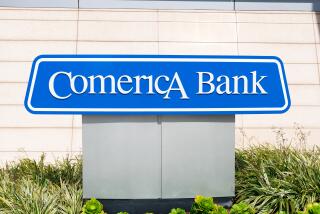U.S. Seizes Insolvent MCorp Banks, Starts Looking for a Buyer
WASHINGTON — The Federal Deposit Insurance Corp., moving quickly after MCorp said it would seek bankruptcy status, said today it seized control of most of MCorp’s subsidiary banks and would promptly seek buyers for them.
The federal regulators closed 20 insolvent MBanks and immediately reopened them as a newly chartered FDIC-owned institution called the Deposit Insurance Bridge Bank, National Assn., Dallas.
The MBanks’ failure is expected to cost the FDIC, already depleted by 221 bank failures last year, between $1 billion and $2 billion. That figure makes it the nation’s third most costly bank failure.
The FDIC said it will seek proposals for the acquisition of the bridge bank, which will be headed by James Gardner, a senior MCorp official.
Action Tuesday
“We are putting the bridge bank up for bids as rapidly as possible. A number of people are interested in concluding a deal for the bridge bank,” FDIC Chairman William Seidman said at a news conference.
The FDIC began the action late Tuesday night and early today, in cooperation with the comptroller of the currency, when MBank Dallas, the largest of 25 banks of the holding company, ceased to be viable, Seidman said.
The action leaves MCorp still in control of five of its 25 MBank subsidiaries. MCorp lost an estimated $900 million in 1988.
The FDIC seizure is the latest round in a tug-of-war with MCorp that has lasted more than seven months. MCorp has resisted FDIC pressure to use its cash assets of roughly $400 million to offset losses at some of its branches.
Although preliminary reports had shown that seven of MCorp’s subsidiary banks, called MBanks, had exhausted their equity capital reserves, they were believed to have held sufficient cash reserves to meet federal requirements. The FDIC’s quick action may have been aimed at preserving assets before they become tied up in bankruptcy proceedings, analysts said.
MCorp asked in October for federal assistance in a recapitalization plan that MCorp management said needed to include an infusion of private capital. MCorp hoped to keep its holdings intact, but some creditors who filed a petition last week calling for involuntary bankruptcy proceedings to begin demanded that the holding company be dissolved.
More to Read
Inside the business of entertainment
The Wide Shot brings you news, analysis and insights on everything from streaming wars to production — and what it all means for the future.
You may occasionally receive promotional content from the Los Angeles Times.










